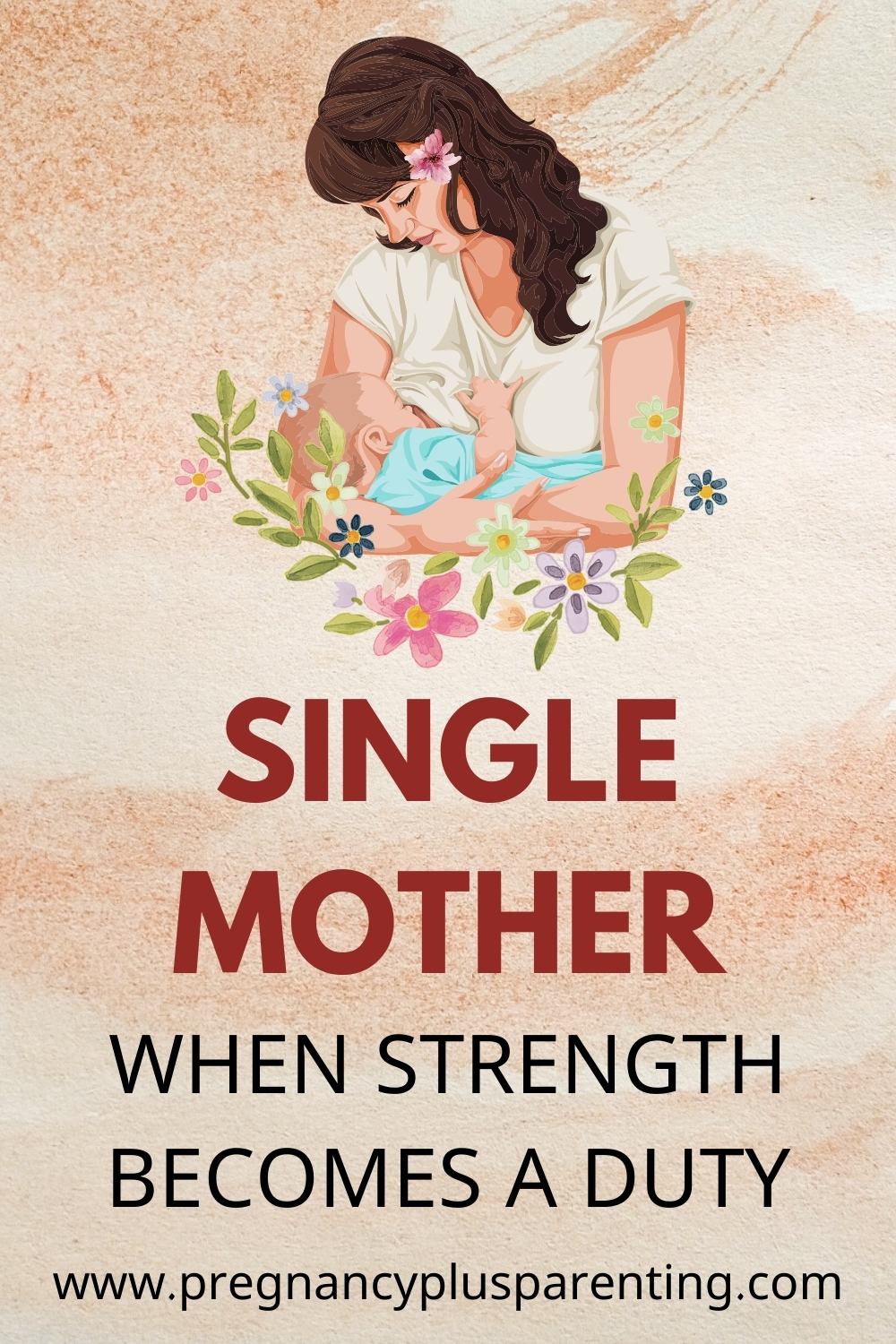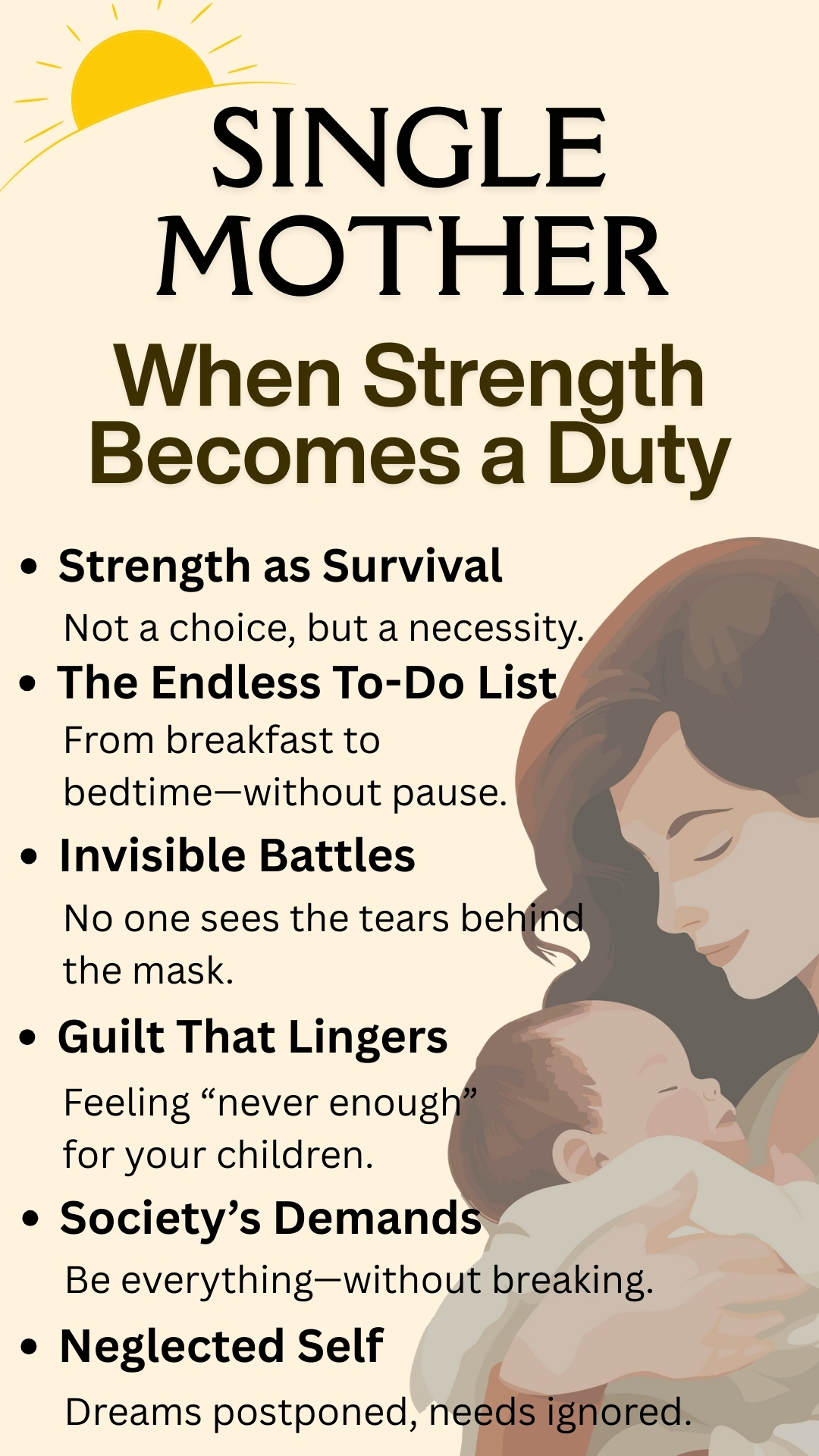Single Mother – When Strength Becomes A Duty
In the morning, the alarm clock rings early. Too early. But there’s no time to linger in bed. The children need to be woken up, breakfast isn’t ready, lunch boxes need to be packed, jackets found, and shoes tied.
A single mother has long since learned that no one else will come along to take these tasks from her. And so, another day begins—sustained not by rest, but by necessity.
She appears strong. Organized. In control. Almost unshakable. But this strength isn’t a choice—it’s a necessity. A mask she wears because there is no alternative.
Strength as Survival Mode
Many single mothers live in a constant state of “functioning.” It’s not a decision—it’s a survival mechanism.
Because who will cook if she doesn’t?
Who will help with homework when she’s exhausted?
Who will earn the money, pay the bills, do the shopping, and take the child to the dentist?
She shoulders all of these responsibilities, often without support. And even when she’s sick—even when every part of her is screaming for rest—she gets up. Every single day. Without a backup. Without a break. Without a safety net.
This kind of strength is often admired, sometimes even idealized. But few see the cost: lack of sleep, inner emptiness, emotional exhaustion—and the slow erosion of her own identity.
When Everyday Life Becomes an Endurance Test
The schedule is relentless: get up, care for the children, rush to work, shop for groceries, cook dinner, oversee homework, do laundry, settle disputes, and coordinate appointments.
No moment of silence. No space for herself.
And then, when the house is finally quiet at night, the carousel of thoughts begins:
“Was I too impatient today?”
“Did I show enough love?”
“How long can I keep this up?”
In those quiet moments, the single mother often feels more alone than ever.
No one asks, “How are you?”
No one sees the tears she holds back to appear strong.
No one notices the inner battle she fights every single day—with herself, with the world, with her fears.
Guilt as a Constant Companion
One of the heaviest burdens many single mothers carry is guilt.
Guilt that they can’t give their children enough—enough time, enough patience, enough stability.
Guilt that sometimes they simply don’t have the strength. That they long for peace. That they feel their own limits.
This guilt seeps in quietly. It drains energy. It stops mothers from caring for themselves.
Because how can you take time for yourself when you feel you’re already failing your children?

Pressure from the Outside
As if the internal pressure weren’t enough, there’s also pressure from outside:
“Did you choose this?”
“Why don’t you find a new partner?”
“Do you even work enough?”
Questions like these reveal how little understanding there is of the complex reality of single motherhood.
Society’s expectations are contradictory:
Be loving but firm.
Be present but also successful in your career.
Be strong but not cold.
Be independent but not too outspoken.
This balancing act is exhausting—and often impossible without neglecting something, or someone.
Invisible Needs
Lost in all of this are the mother’s own needs.
When was the last time she drank a cup of tea without thinking about schedules?
When was the last time she laughed without worrying about tomorrow?
Many single mothers keep going long after their batteries are empty.
They push aside their desires. Postpone their dreams. Ignore the warning signs from their bodies.
Because they believe they have no choice.
Because they’ve learned they must be strong.
But in the long run, self-sacrifice leads to burnout—and often to physical or mental illness.
When Help Is Missing—or Refused
Here’s the paradox: Many single mothers desperately need help but hesitate to accept it.
They fear being judged as incapable or seen as weak.
They don’t want to be a burden.
So they push on. Day after day. Until they simply can’t anymore.
The truth is, accepting help is not weakness—it’s courage.
Whether it’s from friends, family, neighbors, or professionals, no one should have to carry this weight alone.
What Needs to Change
Single mothers need more than admiration. They need real, structural support:
-
Affordable, flexible childcare
-
Family-friendly working hours
-
Financial assistance
-
Networks for genuine connection and support
They need safe spaces to speak openly without judgment.
They need media that portrays their reality honestly—not through stereotypes.
They need communities that offer help, not just advice.
You’re Allowed…
If you see yourself in these words, remember this:
You’re allowed to be tired.
You’re allowed to be angry.
You’re allowed to not be strong sometimes.
You are doing your best—and that is enough.
Your children don’t need a perfect mother. They need a real one. One who loves them, who shows up, and who can also say, “I can’t do this right now.”
Because true strength isn’t in constant functioning—it’s in the courage to take yourself seriously. To rest. To accept help. To say, “I am more than a mother. I am also a human being.”
Conclusion:
When strength becomes an obligation, there must still be room for humanity.
Single mothers live in the space between self-sacrifice and duty, between resilience and exhaustion.
It’s time for their voices to be heard, their feelings acknowledged, and their needs respected.
Because no one should have to be strong alone. And every mother deserves the chance to keep herself intact.







